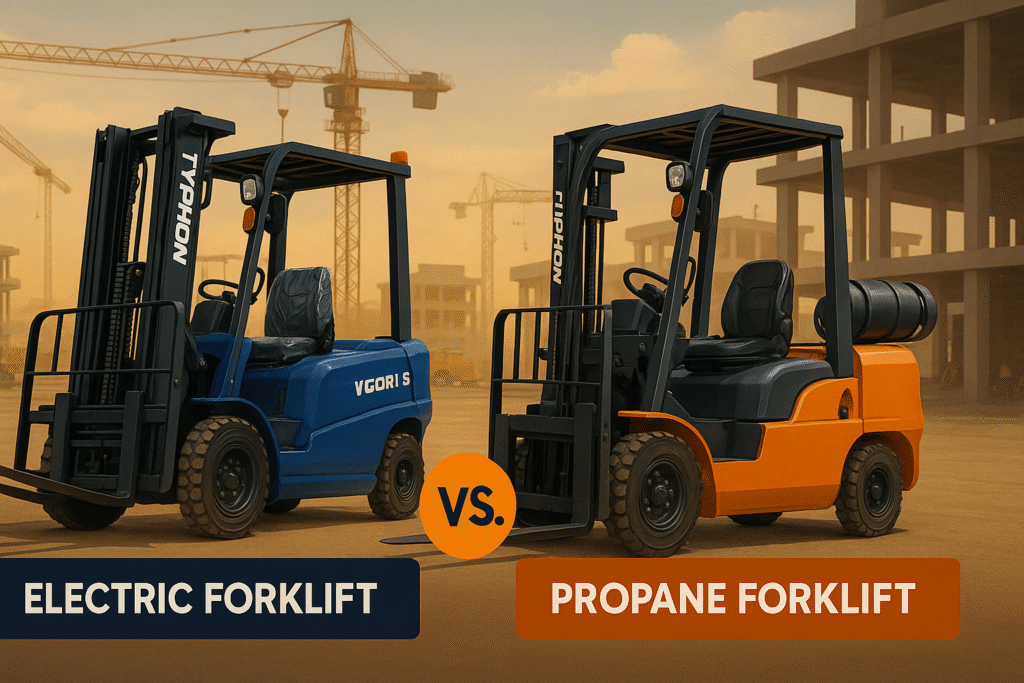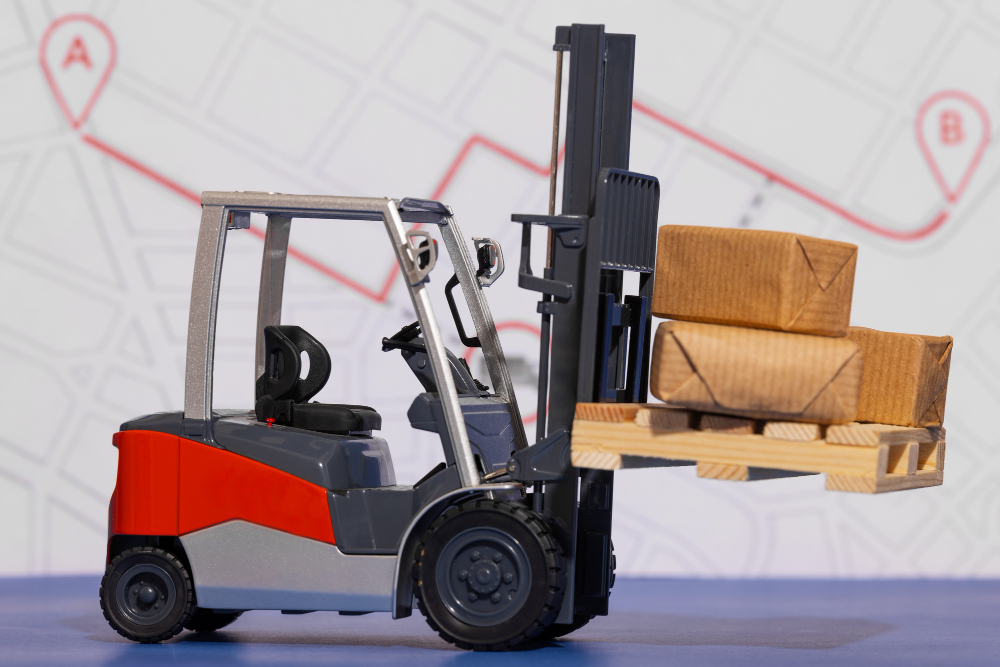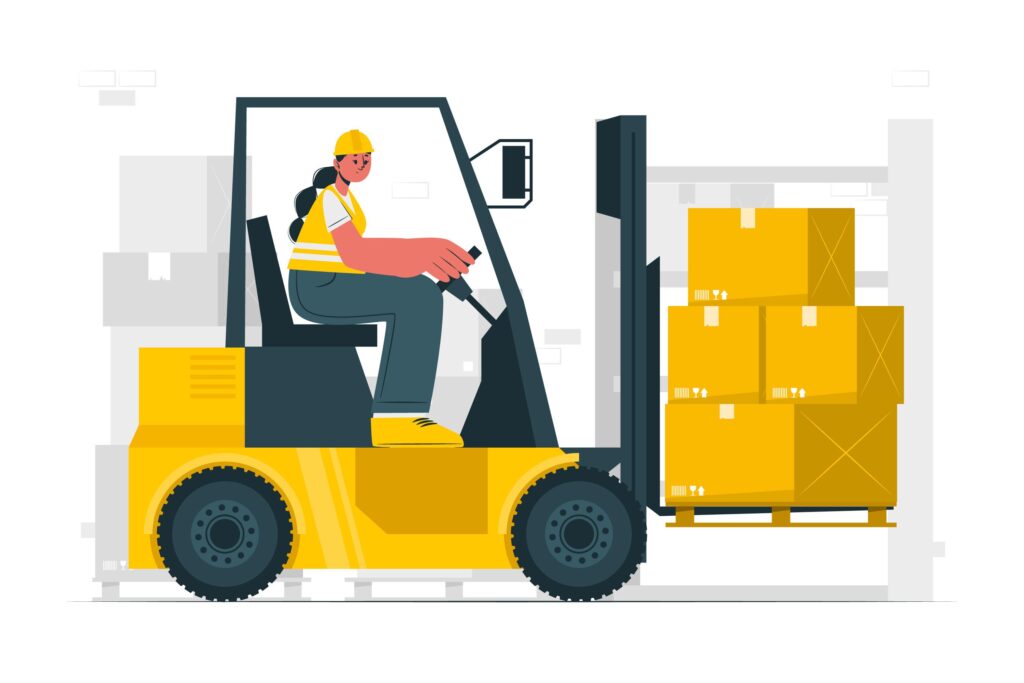Which is Better: Electric or Propane Forklift? 10 Key Factors to Consider
Deciding between an electric or a propane forklift is a vital choice that can have a significant effect on your business and your business’ bottom line. The suitability of a forklift type is a function of several unique factors related to the business’s needs.
While the electric forklifts are emission-free and their maintenance expenses are lower ($1.25 per hour vs. $2.00 for propane), the propane forklifts are the ones that ensure fast refueling and non-stop operation. This article encapsulates 10 crucial factors, equipping you with comprehensive knowledge and confidence to make an informed decision:
- Initial investment, and long-term operational costs
- Environmental impact, and emissions
- Maintenance requirements and durability
- Performance and power output
- Indoor vs. outdoor operation capabilities
Irrespective of the fact that you are only adding to your fleet or changing old equipment, this knowledge will help you in ascertaining the correct forklift for your fleet. Go deep and know your perfect match now.
Key Takeaways:
- Electric forklifts appear to be the best for indoor operations with zero emissions and lower maintenance costs ($1.25/hour), thus being most suitable for warehouses, and grocery stores.
- Propane forklifts are preferred by users for outdoor operations and the possibility of continuous working time, besides faster refuel time while the battery is charging.
- Higher initial investment is required for electric forklifts, but they become cheaper in operational costs and maintenance in the end.
- Environmental reasons are heavily in favor of electric forklift trucks, which produce no tailpipe emissions and do not require expensive emission control equipment.
The efficiency of the forklift trucks depends on the environment. Electric forklifts enable easy turning and work in small areas. Propane forklifts, on the other hand, are better due to their steady power output while the battery charge can be low.
Initial Investment and Operating Costs
1. Purchase Price Comparison
If we compare the acquisition cost of an electric versus a propane model, there is a huge difference in cash outlay. Typically, electric forklifts begin at $35.000 or even slightly more, while the cost of the propane version is less at $24.000 to $30.000. Therefore, propane forklifts come as a plausible option for those businesses which have financial limitations.
However, it is critical to examine not just the cost of purchasing but the total cost of ownership as well. Normally taking advantage of higher capital and then through the reduction of operational expenses, electric forklifts often save more in the long run.
2. Long-term Operating Expenses
Electric forklifts are better than propane trucks in this respect – they cost less in terms of fuel; a very suitable comparison would be if electric forklifts for which electric power is needed to provide the ability to work are compared to propane forklifts with gas as the power source. Gas prices can be somewhere else while electricity is something usually predictable. According to inquiries, electric forklifts can make the less expensive operational cost 75% lower as compared with the propane type.
The cost savings are more that is apparent while they are wearing out. They can be recharged that night at the lowest tariff, perhaps, thus energy is saved in the process instead. A small example can indicate the difference, whereas reinforcing it will be cheaper since a propane tank is continuously replaced and refilled, and this leads to more costs which are incurred.
3. Maintenance Requirements
From a maintenance perspective, electric forklifts are far cheaper to run compared to propane ones mostly because of the high maintenance expenses of the latter. On average, electric forklifts will cost you just $1.25 an hour for maintenance, while any propane models that you purchase will cost around $2.00 per hour. This is due to the fact that electric forklifts have fewer moving parts and thus need fewer check-ups and repairs.
Electric forklifts, for example, no longer need oil changes, spark plug replacements, and fuel system maintenance. The center of attention is mainly on the battery and the electrical system. Nevertheless, the propane forklift needs the regular engine maintenance, fuel system inspections, and faster changes of their parts, which lead to higher long-term costs.
💡 Key Takeaway: The investment in electric forklifts may be higher in the beginning, but their low life-cycle running and maintenance costs make them the most economical option with potential savings reaching 75% in operating costs.
Performance and Operational Efficiency
4. Power Output and Lifting Capacity
Choosing the most suitable piece for the specific material-based operation implies that there are specific features that are necessary for both electric and propane forklifts. In this case, electric forklifts are the best option to pick as they can exhibit immediate power and be consistent as well. Additionally, the other significant benefits related to the power output are easy to use in indoor operations due to their steady power. Furthermore, even if their battery discharges, they can still operate without any problems. But, the performance of these trucks can become worse as the day shift continues.
On the contrary, the performance of a propane forklift is very stable and there is no power reduction from the start till the end. With a better performance in harsh conditions and the capability to climb on steeper slopes, propane forklifts are just the right material handlers for heavy loads. Moreover, their lifting capacity remains intact irrespective of the quantity of fuel in the tank, thus, offering consistent and powerful performance in challenging tasks.
5. Maneuverability and Control
Electric forklifts are maneuverable in tight spaces. Due to their tiny size and low turning radius, they are suitable for tight pathways and packed storage facilities. The controls are responsive, allowing operators to move precisely and maximize working space.
Due to their fuel tanks, propane forklifts are hefty yet nimble. These equipment offer steady power even while transporting large products, allowing lean drivers to handle accurately. Though speed control is less accurate, propane forklifts may not need the operator to maneuver more room for turning than electric ones. Their torque is still decent, which improves handling.
They all feature a variety of control systems, which help operators assure material handling precision.
Forklifts have several power sources. Electric variants reduce most noise and vibration, keeping operators awake and productive. Propane-fueled forklifts may not be as comfortable for operators, but they are.
💡 Key Takeaway: The handling of materials is the strong point of the electric forklifts with propane models excelling at constant power availability and lifting capabilities thus, making a decision based on the specific needs of the work and the environment.
Environmental Impact and Emissions
6. Carbon Footprint Analysis
A comparison of electric and propane forklifts makes their environmental impact very distinct. One of the benefits of electric forklifts is that they are clean and green vehicles that discharge zero emissions, which means they can be easily repowered, being a real asset for companies that are committed to sustainability.
Battery-operated forklifts create the work environment from scratch and do not produce any dangerous chemicals in the form of harmful gases, which is the case with fuel cell forklifts. The zero-emission of electric forklifts helps customers to achieve a safe workplace by minimizing occupational risks.
Propane forklifts are definitely an environment-friendly option. This is a fact that cannot be disputed, as they require the combustion of a fossil fuel that ultimately leads to the emission of carbon dioxide and other greenhouse gases. However, when you compare to other fossil fuels, propane is not as environmentally damaging a choice, as the latter produces less harmful pollution from gasoline or diesel engines.
7. Regulatory Compliance
The current trend of environmental laws becoming progressively stricter, especially for inside operations, means electric forklifts are in full compliance just by virtue of their nature of zero-emission vehicles. This fact makes them the best option for use in the places with strict restrictions on air quality like food or pharmaceutical warehouses, for example.
Propane-fueled forklifts, which are equipped with pollution control devices to reduce harmful emissions, might not still be the right choice moving forward. The companies, often located in the vicinity of very strongly protected environmental areas, generally find electric forklifts to be their best choice of current and futuristic technology in terms of compliance and mitigation. This is also because a significant number of these businesses are under the obligation to share their carbon footprint, which is making electric forklifts more attractive for the fulfillment of sustainability objectives.
💡 Key Takeaway: The electric forklifts, which are able to work without emissions and meet the requirements of new regulations, are much more preferable over the propane ones since the latter, even though better than diesel units, are still responsible for emitting carbon dioxide by using fossil fuels.
8. Application and Work Environment Suitability
The efficiency of the electric and propane forklifts is closely connected with the conditions of the work environment and the application type.
Indoor Applications
The environment indoors benefits from electric forklifts, where they are unmarred by other applications, best of almost all types of warehouses and distribution centers, most common industries. They operate without any carbon emissions which allows employees to work in a favorable environment, a zero-emission operation is thus a factor that increases safety, without ventilation requirements, and there is no concern with harmful toxins affecting the staff. The workers’ productivity and communication can be impacted by noise pollution which can easily be cured by the electric forklifts’ quiet operation.
Clean running electric forklifts are the most preferred in the food, pharmacy, and retail industries as they are indispensable in the cleanliness of the premises and the lives of the people in these industries. The non-existence of exhaust emissions is, therefore, a major factor while cleanliness is the most important of all different businesses that the sector of food, pharmacy, and retail warehouses, has demanded.
Outdoor and Mixed-Use Settings
Propane forklifts excel in outdoor and mixed-environment operations. Construction sites, wood mills, and agricultural fields are all tough environments where forklifts might work. Users of these applications should ensure a consistent run across all temperatures and terrain with propane forklift output power.
Outdoor usage circumstances are great for propane forklift performance, and these machines may go inside. They are fast at periodic refilling and durable since they inflict less damage than other equipment. The technical aspects of the interior context and the transient nature of propane forklift usage may impair ventilation.
💡 Key Takeaway: Electric forklifts are great for clean, quiet, and power-efficient indoor applications, whereas propane forklifts are perfect for outdoor and mixed-use environments that need power and versatility.
Safety and Operator Comfort
9. Safety Protocols and Requirements
In the context of workplace safety, it is necessary for users of both electric and propane forklifts to observe the prescribed safety protocols and procedures. Electric forklifts, being powered by electricity, are environmentally friendly as they don’t emit any hazardous gases. They are, consequently, the best choice for indoor operations in situations where airflow is low and pollution might be high.
Propane forklifts, rather than being the usual dirty diesel vehicles, still need a suitable ventilation system in place as well as regular air quality control checks. The operators should be taught how to safely handle cylinders and their proper storage. Both types of forklifts users must be equipped with personal protective gear, such as safety shoes, high-visibility vests, and hard hats.
10. Ergonomic Considerations
For operator comfort, electric forklifts are unmatched. Electrical forklifts are quieter and less vibration-prone than gas ones, which output less power and are non-vibrating. Electric ones never reach 60 decibels, whereas gas ones emit 87 dB, which is a big difference for long-shift personnel.
Advanced combustion engines make propane forklifts stronger and more vibratory than electric ones, which are quieter and more comfortable. Increased vibration may be the major cause of operator tiredness after prolonged usage. Some have spacious operator cabins since they lack battery compartments.
Both categories include ergonomic forklifts with adjustable seats, easy-to-use controls, and decent vision. They meet the operator’s power source requirements and improve operator comfort with superior suspension and a clear line of sight, regardless of energy source.
💡 Key Point: Although both elements of forklift ask for strict safety protocols, the use of electric models is a way better choice for operators because they contribute to a quieter and vibrationless work environment, which, in turn, is highly favorable for continued operations indoor.
Final Thoughts
Both electric and gas forklifts have perks and downsides. Electric forklifts are greener for interior usage because they create zero emissions, are quieter, and need less maintenance, while gasoline ones are preferable for cleaner outdoor settings since they refill rapidly and have an uninterrupted power source. The practical option depends on your needs and operations.
Consider work atmosphere, length, cost, and impact. Consider surroundings and interior appliances while using an electric forklift. Since the engine runs continually and there’s a lot of outside work, the propane forklift is better. Choosing the appropriate forklift influences your business. This informed, customized choice will set the foundation for years of excellent material management for your organization.
FAQs
What is the time constraint between charging an electric forklift battery to when a propane forklift is fueled?
An electric forklift typically takes 6-8 hours for a full battery charge, while propane cylinder replacement takes only 5-10 minutes. However, many companies choose opportunity charging during the breaks to maintain uninterrupted operations with electric forklifts.
Can propane forklifts be used in food storage facilities?
Propane forklifts can be used in food storage areas with adequate ventilation, but electric forklifts are the most viable option owing to the fact that no emissions and harmful fumes are generated. A large number of most grocery outlets and food warehouses are utilizing electric forklifts to keep intact their their products and air quality.
What is the average lifespan difference between electric and propane forklifts?
An electric forklift on average has a lifespan of 10-15 years when maintained properly, while propane forklifts average 8-12 years. The main reason behind the prolonged existence of electric forklifts is fewer wearable parts and the absence of an internal combustion system, which results in lower damage.
Are there any weather-related limitations for electric forklifts?
Electric forklifts work well in most cases but in extreme cold they are less efficient than propane trucks. Propane forklifts, however, deliver stable performance regardless of weather conditions, so their use is preferable in heavy-duty outdoor work in a wide range of climates.
How do electric and propane forklifts compare in terms of noise pollution?
Electric forklifts are running at lower than 60-70 decibels, which is quite a significant contrast from the 80-90 decibels of propane forklifts. This is a good thing because electric forklifts will work well in such locations as warehouses where multiple shifts are performed and noise is the main issue.
If the workers operate on a lower gas or electric forklift, what training will be needed then?
The workers will have to receive training when working with a different type of forklift vehicles. The electric forklift training is about battery maintenance, and charging procedures, indeed the propane forklift training automatically is about safe cylinder handling, and fuel system maintenance protocols.



